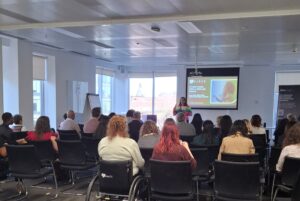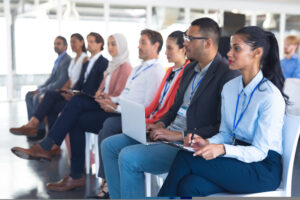

IEMA’s Senior Communication Officer Farhana Khan reports back from the Diverse Sustainability Initiative’s second in-person gathering.
It’s a lovely, sunny, crisp winter’s day as I weave my way through busy central Birmingham to One Colmore Square, home to Hays’ Birmingham Office, where the second in-person Diverse Sustainability Initiative (DSI) event is due to begin.
IEMA’s DSI is now four years old, having been set up in March 2021 to address the problem of the lack of diversity within the sustainability profession and wider environment sector.
The overall goal of the DSI is to build a profession and sector that, over time, is reflective of modern Britain. No mean feat – and certainly not one that can be resolved in a hurry. Addressing a complex and deep-seated problem such as this takes time; to encourage decision-makers to step up, change attitudes and challenge myths, and see the change happen in front of us.
While this work is ongoing with the organisations signed up to the DSI, it’s more important than ever that those from minority backgrounds have opportunities to meet like-minded people and build solidarity, and that they have spaces to share their concerns without hesitation or fear.
The DSI runs two networks currently, a People of Colour Network, and LGBTQIA+ Network, where they can do just that. As a member of both networks, it’s comforting to know that I have a sounding board for the anxieties of working in a sector with so few people who look like me.
The day starts with networking, and as I enter the room I’m met with the buzz of introductions, conversations, smiles and laughter from those already acquainted, and the immediate feeling of being in a safe and welcoming space.
Lunch is served, and conversations continue over cups of coffee and sandwiches before IEMA’s CEO, Sarah Mukherjee MBE, addresses the audience. She welcomes us and gives thanks to Hays for hosting, and to Caris Graham, IEMA’s senior diverse sustainability officer, for organising the event.
In Sarah’s words: “It is a privilege when young people choose to work in this sector. We should celebrate and support them, whatever background they come from.” This is something that Sarah told IEMA’s board back in 2021, which influenced the creation of the DSI.
Our first session is with Barry Boffy MBE, FIEDP – a senior global diversity, equity, and inclusion (DEI) consultant. He tells us that despite ‘anti-woke’ sentiment, DEI isn’t going anywhere. In fact, he has experienced an increase in enquiries following calls to roll back DEI initiatives after Trump’s election in the US.
Barry talks us through hot topics in DEI for 2025, noting civil unrest, isolationism and extremism, changing geopolitical landscapes and the testing of UK Equality Act legislation in the courts. Echo chambers are dangerous, and now is the time to bring everyone with us, value differences, and create consciously inclusive environments.
For Barry, the business case for DEI is clear: businesses need innovation and growth, and this comes with challenging the status quo. Employees are more aware than ever of the impacts of toxic workplaces and the need for work-life balance. If businesses don’t adapt, they are missing out on top talent and risking their futures.
As for how we can keep things moving forwards, Barry’s advice was: Identify your evangelists and antagonists, motivate and incentivise engagement with DEI initiatives, and identify immediate small steps you can take each day to get closer to the goal. It’s a marathon, not a sprint.
After a quick break, we’re all back in our seats eagerly awaiting the next ‘Sustainability Superstars’ session from Pam Burrows. Pam’s specialism is dealing with burnout, stress, and wellbeing – all of which are interlinked with DEI. In her high-energy workshop, she goes through different approaches to DEI to help support wellbeing, with an emphasis on listening to and learning from lived experiences, and challenging bias in decision-making and leadership.
A key point was that none of us have just one identity – we have multiple intersecting identities that influence our life experiences, barriers and successes. Therefore, a one-size-fits-all approach to DEI is inherently exclusive, and can compound existing biases.
One brilliant attendee graciously called in Pam’s use of the word ‘intersectionality’, which, she explained, specifically speaks to Black women’s experience of how their gender interacts with their race to further entrench inequalities. The exchange was a perfect demonstration of how we can bring people with us on this learning journey towards a more equal and inclusive world, with kindness and grace prioritised over blaming and shaming.
Pam’s session comes with a warning: DEI should be constructive, not destructive. In the age of cancel culture, it’s important to make clear that shared values are an opportunity to create harmony in the workplace, rather than engendering division.
Workplace culture is best defined by the organisations’ behaviour, rather than the values written on the wall. Listening, sharing ideas, valuing identity, and taking action are all part of the process of ensuring that employees feel seen, heard and respected in the workplace. In small groups, we audited our workplaces based on these four behaviours, and shared with the group what we felt we were getting right and where we could improve.
Some insightful feedback sparked a group conversation – while some senior leadership teams have good intentions, their actions don’t always fulfil the needs of the workforce. This is why it’s so important to allow for information to flow from employees to leadership, not just the other way around. We also discussed the say-do gap – are employers doing what they say they will do? These are all things that senior leaders should consider as key advocates in the DEI space with the power to shift the dial.
We then discussed what it means to be an ally, actively. We talked about ways we can address harmful language in the workplace, empower other people by passing the mic, be the mentors we wish we’d had, and set an example.
Finally, Pam took us through her strategy for recovering from burnout. “Recovery is possible, but not automatic,” she said. You need compassion (for yourself), to acknowledge (even the small wins), reality (of what you can give with the resources and energy you have), and energy (eat, drink, rest and recharge).
At the end of the session, we are all invited to write a pledge on a post-it note for how we were going to advocate for DEI and wellbeing, either personally or professionally. Here are a selection from the day:
- Commit to continually building and sharing knowledge and learnings, and to be ok with getting things wrong
- Share and celebrate colleagues’ small everyday wins
- Challenge inappropriate behaviour safely and constructively
- Spread the idea that inclusion never excludes
- Make time for joy
- Think about whether what we are doing in our organisation is landing how we hoped it would
Beatrice Anomah Project Manager for Inclusion and Climate Justice from Students Organising for Sustainability UK invites all attendees to the second annual Racial Action for the Climate Emergency (RACE) Summit, organised by the RACE Report and the DSI on Thursday 3rd July 2025 at King’s College London. The summit will bring together young people, CEOs, HR professionals, and People of Colour for progressive conversations, networking opportunities, and action-oriented workshops to create a more inclusive environmental sector.
Caris Graham ends the day with an update on the DSI’s plans for 2025, including an overview of its People of Colour Mentoring pilot scheme, which has seen 19 mentees matched with 18 mentors to address the need for positive role models and advocates to help People of Colour to thrive in the sector.
With a final hour for networking, I’m speaking to people from all different professions and industries, from local authorities to the charity sector, independent consultants and CEOs. People are discussing their favourite parts of the day, picking up on conversations started during the workshops, and exchanging details to follow up their conversations another time.
As people slowly trickle out of the door to make their way home, there’s an overwhelming sense of positivity and optimism, and that, despite the challenges of the sector, progress can be made through community, advocacy and action.


